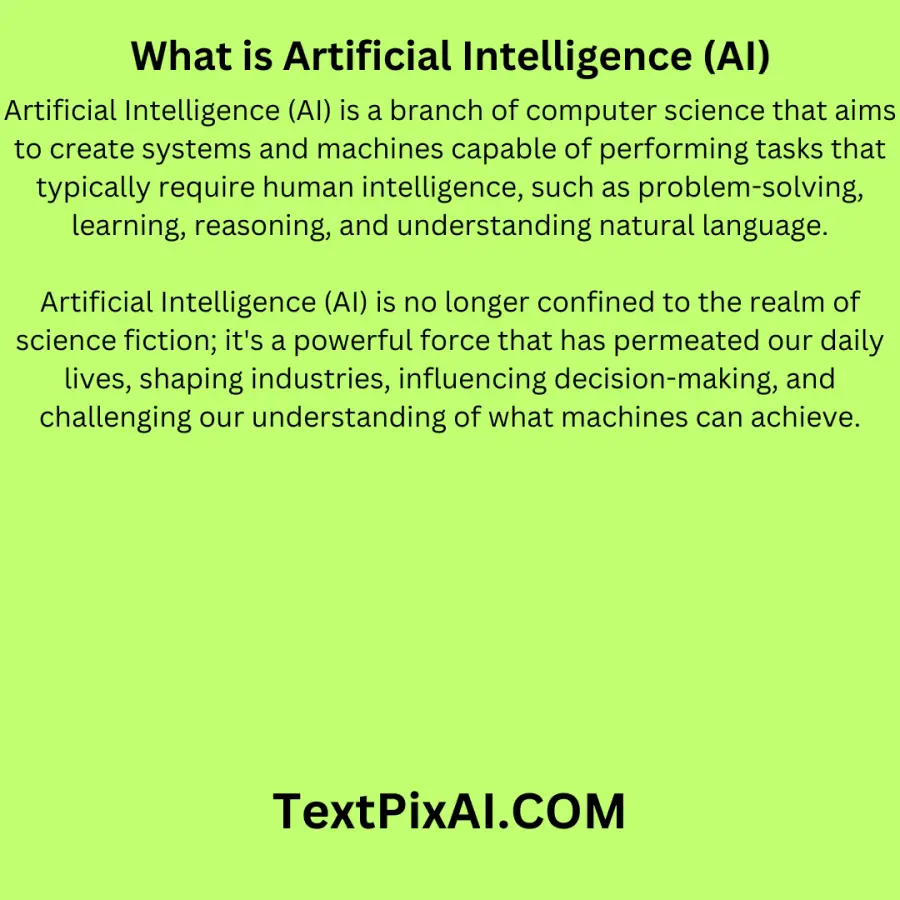What is Artificial Intelligence (AI)
Introduction
Artificial Intelligence (AI) is no longer confined to the field of science fiction; it's a powerful force that has permeated our daily lives, shaping industries, influencing decision-making, and challenging our understanding of what machines can achieve. In this comprehensive guide, we will embark on a journey to explore the world of AI, from its fundamental concepts and historical evolution to its real-world applications, ethical implications, and the exciting future it holds.
You may also like to read:
Defining Artificial Intelligence
What Is AI? Artificial Intelligence, commonly referred to as AI, is the emulation of human intelligence in machines. It involves the development of computer systems capable of performing tasks that typically require human intelligence, such as understanding natural language, recognizing patterns, making decisions, and learning from experience. AI systems are designed to process vast amounts of data, make predictions, and continuously improve their performance.
AI vs. Human Intelligence While AI has made significant advancements, it's important to distinguish between artificial and human intelligence. AI systems excel in specialized tasks but lack the general intelligence, intuition, and consciousness associated with human beings. While AI can process data and identify patterns at incredible speeds, it lacks the nuanced understanding and emotional intelligence that humans possess.
Types of Artificial Intelligence
Narrow or Weak AI Narrow AI, often referred to as Weak AI, is designed for specific tasks and applications. These AI systems are highly specialized and excel in their designated areas. They are not capable of generalizing their knowledge or adapting to tasks outside their domain. Examples of narrow AI include virtual personal assistants like Siri and chatbots used in customer support.
General or Strong AI General AI, also known as Strong AI, is a theoretical concept where machines possess human-like general intelligence. In essence, it implies that these machines can perform a wide range of tasks at a level comparable to, or even exceeding, human capabilities. Achieving Strong AI remains a long-term goal and a subject of ongoing research and debate.
The History of AI
Early Beginnings The concept of AI dates back centuries, with ancient myths and legends featuring intelligent, autonomous machines. However, the formal field of AI emerged in the mid-20th century. The term "artificial intelligence" was coined by computer scientist John McCarthy during the Dartmouth Conference in 1956, marking the birth of AI as a discipline.
The AI Winter and Resurgence AI development has been characterized by periods of enthusiasm and disappointment, often referred to as "AI summers" and "AI winters." These cycles were driven by the challenges of limited computing power and data availability. However, the recent resurgence of AI is powered by exponential increases in computational capabilities, the availability of large datasets, and advances in machine learning algorithms.
How Does Artificial Intelligence Work?
Machine Learning Basics At the heart of AI is Machine Learning (ML), a subfield that focuses on developing algorithms capable of learning from data. Unlike traditional programming, where explicit instructions are provided, ML algorithms learn patterns from examples and data. Three primary types of ML include supervised learning, unsupervised learning, and reinforcement learning.
Neural Networks and Deep Learning Deep Learning, a subfield of ML, has gained prominence in recent years. It involves the use of artificial neural networks, inspired by the structure of the human brain, to model and solve complex problems. These networks consist of layers of interconnected nodes, or neurons, and have demonstrated remarkable success in tasks such as image recognition, natural language processing, and autonomous driving.
Real-World Applications of AI
AI in Healthcare AI is revolutionizing the healthcare industry by enhancing disease diagnosis, personalizing treatment recommendations, and expediting drug discovery. Machine learning models analyze medical data, including patient records and imaging, to assist medical professionals in making more accurate diagnoses and treatment decisions.
AI in Finance The financial sector harnesses AI for algorithmic trading, risk management, and fraud detection. AI-driven trading algorithms execute transactions with precision, while predictive analytics assess and mitigate financial risks. AI plays a pivotal role in ensuring the stability and security of financial systems.
AI in Natural Language Processing (NLP) Natural Language Processing (NLP) is a branch of AI that focuses on the interaction between computers and human language. AI-powered NLP algorithms enable automated customer support, language translation, and sentiment analysis of text data. They facilitate seamless communication and data analysis across various industries.
The Ethical and Social Implications of AI
Bias and Fairness AI systems can inherit biases present in their training data, leading to discriminatory outcomes. Addressing bias and ensuring fairness in AI algorithms are critical ethical considerations. Researchers and developers are actively working on techniques to detect and mitigate bias in AI systems.
Privacy and Security The proliferation of AI raises concerns about data privacy and security. AI algorithms often require access to vast amounts of personal data, making it imperative to handle such data with care to protect individuals' privacy and guard against potential security breaches.
Job Disruption and the Workforce The automation capabilities of AI have sparked concerns about job displacement. While AI may automate certain tasks, it also creates new job opportunities in AI development, data science, and related fields. Preparing the workforce for the changing job landscape is a crucial societal challenge.
The Future of Artificial Intelligence
Emerging Trends The future of AI is filled with exciting possibilities. Emerging trends include quantum computing, which has the potential to revolutionize AI by performing computations at speeds unattainable by classical computers. Ethical considerations, such as transparency and accountability, are gaining prominence as AI becomes more integrated into society.
AI in Research and Innovation AI is becoming an indispensable tool in scientific research and innovation. It accelerates drug discovery, aids in climate modeling, and assists in understanding complex phenomena. AI's ability to analyze vast datasets and identify patterns contributes to breakthroughs in various fields.
Tools and Resources for Learning AI
Online Courses and Platforms For those interested in learning AI, numerous online courses and platforms offer comprehensive AI education. Platforms like Coursera, edX, and Udacity provide courses suitable for learners of all levels, from beginners to advanced practitioners.
Books and Research Papers A wealth of knowledge is available in the form of books and research papers on AI. Notable works include "Artificial Intelligence: A Modern Approach" by Stuart Russell and Peter Norvig. These resources offer in-depth explorations of AI concepts and applications.
Conclusion
Artificial Intelligence has transitioned from a concept in science fiction to a powerful force driving innovation across industries. It has the potential to transform healthcare, finance, education, and countless other domains while presenting ethical challenges that demand careful consideration.
As we navigate the ever-evolving landscape of AI, we must embrace its potential while addressing its ethical and societal implications. The future of AI holds great promise, with emerging trends and innovations poised to shape our world in ways we have yet to imagine.
References and Further Reading
For readers eager to delve deeper into the world of AI, here are some recommended resources:
- Coursera: AI for Everyone
- edX: Artificial Intelligence
- Book: "Artificial Intelligence: A Modern Approach" by Stuart Russell and Peter Norvig
Artificial Intelligence is not just a technological advancement; it represents a journey into the future, where machines and humans collaborate to achieve new heights of innovation and understanding. As AI continues to evolve, so too will our understanding of what is possible in the field of artificial intelligence.








